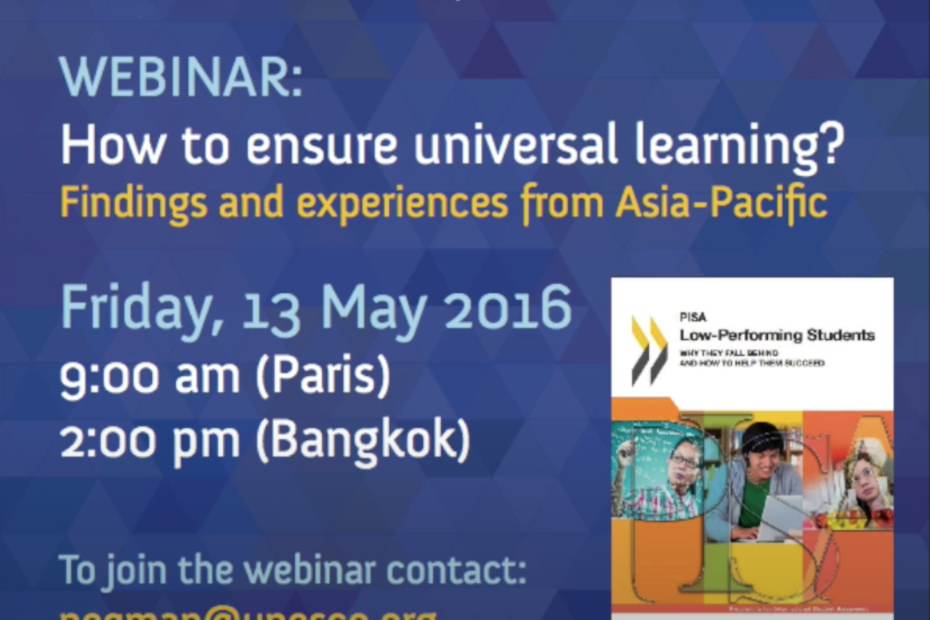The Network on Education Quality Monitoring in the Asia-Pacific (NEQMAP) Secretariat at UNESCO Bangkok organized its first webinar “How to ensure universal learning? Findings and experiences from Asia-Pacific” in collaboration with the OECD. The webinar was held on 13 May 2016, with approximately 90 participants registered from various countries. The webinar invited Dr. Alfonso Echazarra from the OECD Directorate for Education and Skills as a speaker and Dr. Hye-Won Lee from the Korea Institute for Curriculum and Evaluation (KICE) as a discussant. The interactive webinar platform allowed participants to engage with the presenters by asking questions throughout the session which were answered at the end of the webinar.
Many countries in the Asia-Pacific region formally administer national as well as international assessments to monitor the quality of education system and learning outcomes of their students. Despite this progress, the data from international assessments suggest big variation among countries in terms of student performance. For example, some countries/jurisdictions from East Asia were among the top performers in PISA 2012, while countries from Southeast Asia demonstrated poor performance, scoring below the OECD average scale in the three subject areas. However, what is also revealed by the results from these international assessments is a significant gap in student performance within the countries. This gap exists regardless of the country’s economic status and development of the education system. Identifying why these gaps exist and how to close the gap between higher and lower performers remains a challenge.
The OECD’s recent publication “Low Performing Students: Why they fall behind and how to help them succeed” highlights this issue while addressing the possible factors associated with it. The webinar therefore aimed to shed light on the relevance and implication of this issue in the context of the Asia-Pacific region.
Following a brief introduction of NEQMAP and description of the webinar’s focus by the NEQMAP Secretariat, Dr. Echazarra gave a presentation that discussed why low performers fall behind and how to help them succeed in the context of PISA. OECD data indicates that students with a socio-economically disadvantaged background are seven times more likely to be low performers across PISA participating countries. One key finding shared by Dr. Echazarra is that the risk of low student performance is cumulative and multidimensional; in addition to socio-economic status, demographic background (e.g. living in a remote area, language barrier, immigration background) and lack of progress through the education system (e.g. less or no pre-primary, grade repetition) are also significantly influential in identifying the risk of low performance.
In terms of how to address low performance, evidence shows that high performing countries tend to practice more socio-economic inclusion in schools. It also suggests that in schools where there is a lot of teacher support provided, students are less likely to be low performers, which may stress the significant role which teachers play in enhancing learning performance.
Following the speaker’s presentation, the discussant, Dr. Hye-Won Lee of KICE shared the experience of the Republic of Korea in dealing with the issue of low performance. As a mechanism to identify low performers, the country administers the National Assessment of Educational Achievement (NAEA) with the aim to measure students’ learning outcomes, identify the characteristics and trends of learning, and to evaluate the quality of education. The results of NAEA are shared with individual schools and provide valuable feedback for improving learning performance. Numerous proactive intervention programs were then cited by the discussant as examples to show how equity in education is ensured through resource allocation to schools. Finally, by using two representative policy examples: “Schools for Improvement” and “Do-Dream Schools”, she explained how the Korean education system supports teachers to help low performers on the basis of shared accountability with other key stakeholders (Ministry of Education, local communities & charities, Municipal & Provincial Office of Education, and research institutes).
The webinar participants shared their questions and comments via chat and email before and during the webinar, which were then answered by the speakers, ensuring a rich exchange. Overall, the webinar successfully provided an opportunity for stakeholders in the Asia-Pacific region to learn more about student performance gaps and how to address them, and also to interactively engage with each other. Promotion of such knowledge sharing is one of the key activities of NEQMAP as a collaborative platform to enhance student learning assessment systems in the countries of the region.
Webinar Presentations
